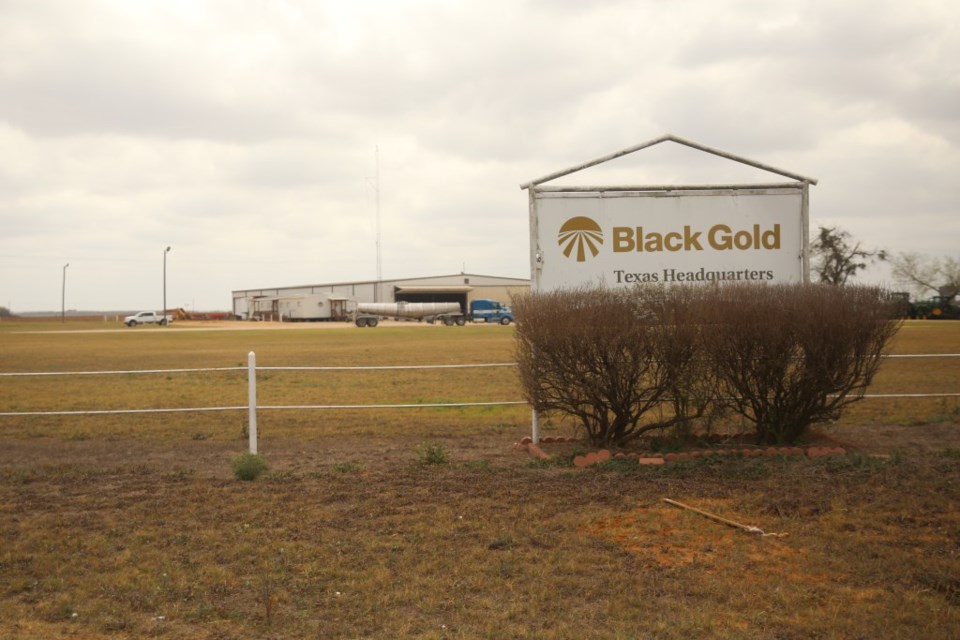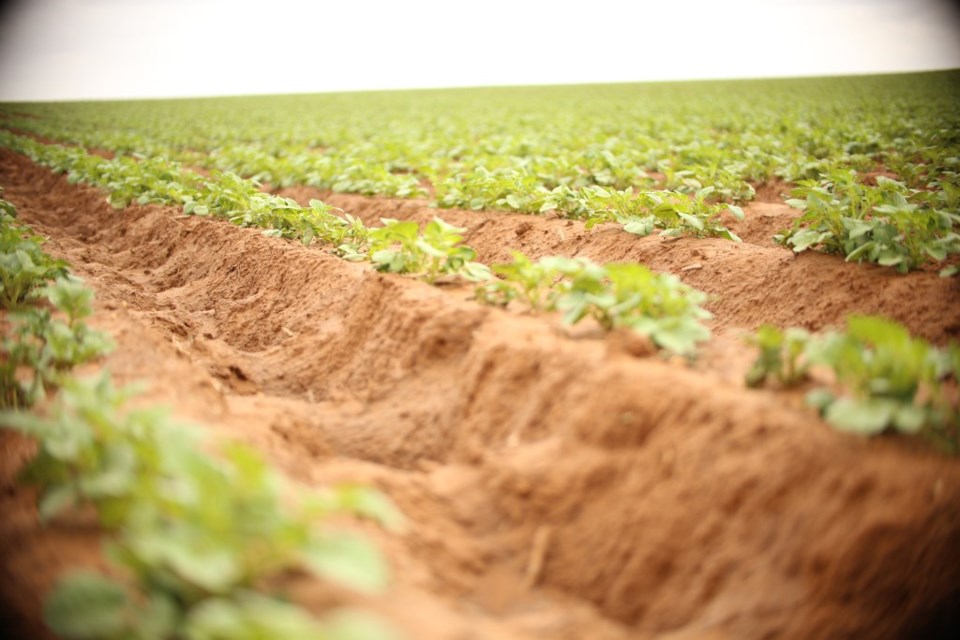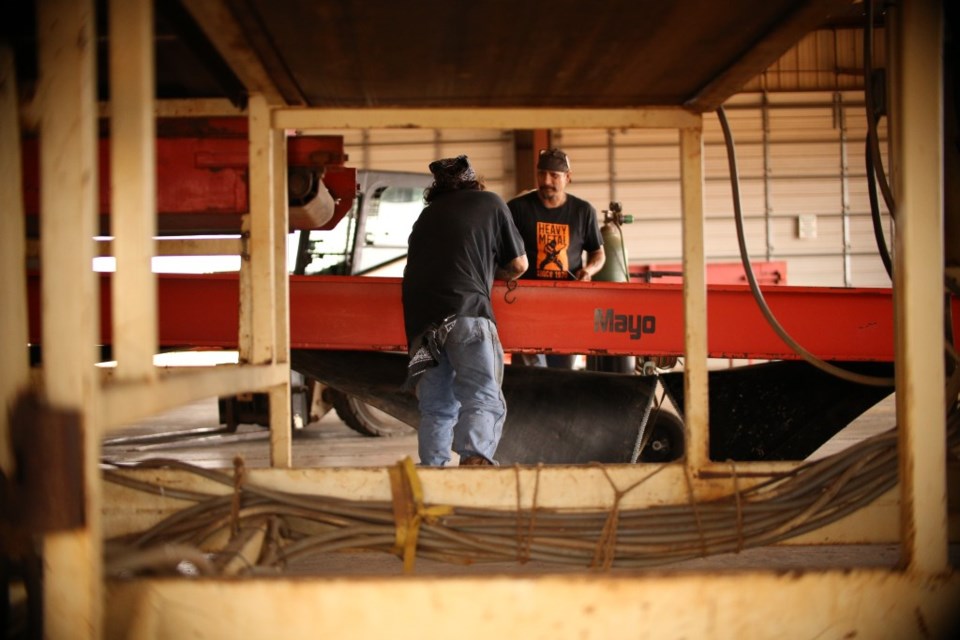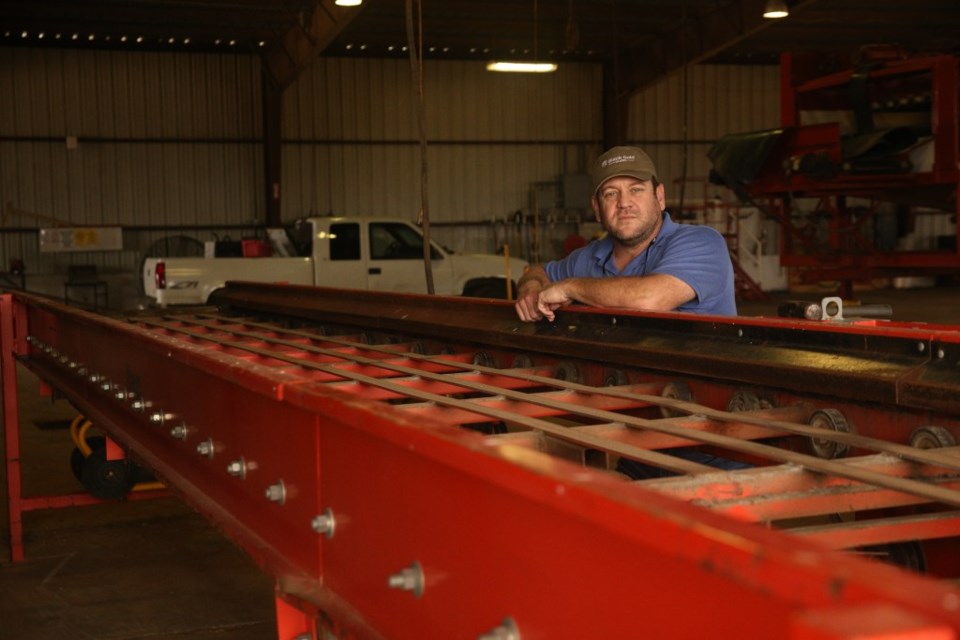Steven Wright sits behind the wheel of his big red Ford F-250, driving on country roads on the outskirts of Pearsall, Texas—a good five hour trip from Collin County—until he pulls up to Black Gold Farms, a plot of land that is mostly covered in damp, deep reddish-orange dirt.
As Wright steps out of his truck, his boots sink into the soil. He’s wearing blue jeans, a blue polo, and a brownish-green hat that reads “Black Gold Farms.” He says if his wife knew he was getting his picture taken that day, she would have told him to shave.
When he gets close enough, he can see little green leaves peaking out of the ground. Those are potato plants. There are about 2.5 million of them on this plot of land, 21,000 per acre. Their seeds have all been meticulously placed in the ground using GPS technology to ensure the land is used as sustainably as possible.
“Everybody thinks sustainability is just recycling, but there’s so much more to it,” Wright says. “We recycle our paper and our steel, and those kinds of things, but it’s doing more with less: that’s really what we focus on.”
A lot of companies these days, he continues, are looking for ways to be more sustainable. “It’s all driven by the marketplace, so if you want to be successful, you have to be sustainable.”
One of those companies is PepsiCo.
A couple of years ago, PepsiCo unveiled new strategies for building a more sustainable food system. This agenda was laid out in their 2018 sustainability report. "As an industry leader, we have a responsibility to help spur the use of renewable energy in the U.S., while encouraging the kind of systemic change that can build a more sustainable food system," Simon Lowden, PepsiCo’s first Chief Sustainability Officer, said in a press release.
Even as the COVID-19 pandemic brings so many things to a sharp halt, PepsiCo is still focused on its sustainability efforts. “The work continues,” Lowden told GreenBiz, a media company that chronicles how businesses align sustainability with their profitability. “This is such a rapid changing space that we’re actually always evaluating, reevaluating our posture, our strategies, our intent, what our key message should be. We’re doing that work right now.”
Lowden discussed several ways PepsiCo can play its part in climate action plans. One is focusing on its colossal agricultural footprint; they work with tens of thousands of farms globally to help them reach the highest yield with the lowest input.
Additionally, he pointed out that PepsiCo works with these farms to ensure they are using the right amount of pesticides and fertilizers at the right time, so the land can be reused.
“That’s a big responsibility we have,” Lowden says. “Not only is it ensuring the farmers are economically, fiscally trained the right way and healthy, but the land we leave behind and the land that’s being used is healthier than it would have been without our expertise and is able to play its role in the climate change dynamic.”
Wright happens to be one of those farmers. Black Gold Farms is part of PepsiCo’s flagship sustainable farming programs. The two companies have been working together for over three decades. “Black Gold Farms has always been concentrated on sustainability,” he says. “It’s about preservation.”

Wright grew up in the agriculture business. His family owned farmland in the lower Rio Grande Valley and in Laredo. There, they grew “just about anything you can grow in South Texas,” Wright says. He worked the fields after school and on weekends. They were his home in the summer.
Farming was in his blood and landed him at Texas Tech University where he earned a degree in agronomy, the science and technology of crop production. He took a lot of classes on plant health biology and chemistry, which come in handy in all the work he does today.
After graduating, Wright went back to work on his family’s farm for a few more years before they decided to call it quits. He says companies were beginning to want to work with “one-person suppliers” to grow crops throughout the year. Additionally, seed varieties were being developed that were cold and heat tolerant and could grow year-round. Now, Wright says, “you can grow watermelons in Alaska, if you like.” Their industry was changing and they couldn’t keep up with customer demands.
He worked at Del Monte Foods for about 10 years before he found himself at Black Gold Farms.
Black Gold, as a brand, has been around since 1965, but its history dates back even further. At the tail-end of the ’20s, Hallie Halverson, the first of a four-generation potato-farming family, got stuck with a loan collection issue in North Dakota. He was able to work it out with a land trade, which resulted in the first 10-acre plot of potatoes. Today, they have 11 farm locations, including the one in Pearsall, Texas, where Wright is the farm manager. From start to finish, Wright oversees the growing of all of the farm’s potatoes. It’s a lot of paperwork, record keeping and working with people—training and promoting them—not as hands-on as the work he did at his family’s farm.
Wright says sometimes he misses working out in the field, where he could sit, drive his tractor and forget everything for a few hours. He still has these moments every now and again when there isn’t too much paperwork.
In 2018, all the chips produced in Frito-Lay’s North American portfolio (owned by PepsiCo) were made out of potatoes from sustainably sourced farms like Black Gold. The farms that PepsiCo works with are independently verified, meeting 114 social, environmental and economic principles of their sustainable farming program.
Through the program, which includes 44,000 farmers around the world, PepsiCo engages with growers to give them the capability to produce more sustainably, address relevant risks and promote continuous improvement. This mindset is what Wright loves about his job today. He says every day is a chance to do better than the day before.
“It’s everchanging,” he says. “No two days are the same. Growing up with it, I kind of got an appetite for the farming. I’ve always had a love for producing food and feeding people.” Learning to produce more sustainably and do more with less, Wright says, is “a challenge that you definitely have to have a love and a passion for to do it.”

For the last two years, Wright has driven from his home in Brownsville to Black Gold’s Texas farm to make sure the potato crop comes out just right. Out his window, he can see one of their center pivot irrigation systems watering crops. If they begin to over or under-water, the whole system will be shut off and inspected.
“We take water efficiencies on these to make sure we’re putting out the same amount of water throughout the crop,” he says.
PepsiCo has set a goal to improve water-use efficiency in their agriculture supply chain by 15 percent in high-risk areas where they source crops like potatoes. Wright makes sure Black Gold’s practices align with this goal.
When the potatoes are ready to harvest, the plots of land will be blanketed in green leaves. The harvester will go through the field, picking all the potatoes from the ground and shaking off any excess dirt before collecting them in a crop cart. The crop then gets driven to one of the farm’s sheds to go through the washline.
Employees at the farm, like Albert Torres and Noah Martinez, will run the potatoes through a hydrosorter, which washes them and separates them from any rocks or clumps of dirt that clung on through the harvesting process. The water from the hydrosorter is collected in a settling pond to be pumped into another irrigation system for another crop.
Torres says the whole process is a time crunch. They have a schedule to keep with the frying plant, so every minute counts. “It’s just a game. It’s just a puzzle,” Torres says. “That’s all it is to us.”
Wright mentions that Gregg Halverson, the CEO and president of Black Gold Farms, was able to make the company’s delivery process more sustainable. He calls him a pioneer.
“He was one of the first ones, a founding father of Black Gold Farms, to say, ‘How do we do this to where we can deliver better quality to where Frito Lays is frying potato chips?’”
They ended up strategically placing farms closer to Frito Lays frying plants so they could cut back on millions of miles. “That was one of the leading things that led to locations versus just having one big farm and sending the stuff to Texas from North Dakota or Michigan or somewhere else,” Wright says. “PepsiCo really pushed that and Black Gold Farms was one of the first to do it.”

In February, Texas confirmed its first case of the novel coronavirus, COVID-19. Not knowing what the virus would later become, Wright joked that if people had to stay home, maybe they would eat more potato chips and drink more Pepsi.
Since then Texas is recording more than 10,000 cases of COVID-19 daily. Frio County, where the farm is located, has not been completely spared by the coronavirus. With a population of about 20,000, there have been 293 confirmed cases of COVID-19 in Frio. There have not been any confirmed deaths yet.
In a statement in late June, Ramon Laguarta, chairman of PepsiCo’s board of directors and chief executive officer, said the food system was under tremendous stress before the pandemic. Laguarta says the company has the opportunity and the responsibility to continue building a more sustainable food system.
Wright says not much has changed at the farm since the pandemic broke out. Wright says he’s had to implement special precautions at the farm in Pearsall like social distancing and wearing masks. So far, one of the employees on his small 15-person crew has tested positive for the coronavirus. Wright says the employee has since recovered and returned to work.
As an essential business, Black Gold continues to produce and ship potatoes to feed communities across the country. It’s an important mission for Wright who only wants to work for a company that takes sustainability seriously.
“We haven't been doing this in vain,” he says. “We've actually been doing this, you know, the right reasons. It’s been really good to see that. I think the more that people understand where their food comes from, and how it gets produced, the better it is for everybody.”
Originally appeared in the September/October issue




